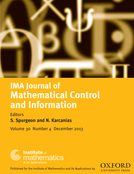-
Views
-
Cite
Cite
Xiaoe Ruan, Jianyong Zhao, Convergence monotonicity and speed comparison of iterative learning control algorithms for nonlinear systems, IMA Journal of Mathematical Control and Information, Volume 30, Issue 4, December 2013, Pages 473–486, https://doi.org/10.1093/imamci/dns034
Close - Share Icon Share
Abstract
In this paper, conventional first- and second-order proportional-derivative-type (PD-type) iterative learning control (ILC) updating algorithms are discussed for a type of nonlinear time-invariant system. On the basis of the Bellman–Gronwall inequality, the convergence is derived in the sense that the tracking error is measured in the form of the Lebesgue-p norm. This analysis shows that, under an appropriate condition, the first-order PD-type ILC updating law is monotonically convergent while the second-order law is convergent and the monotonicity is guaranteed after finite iterations. Further, by analysing the characteristic polynomial of the second-order PD-type ILC updating law, an argument about the comparison of convergence speed in terms of Qp-factor is made. The argument clarifies that the second-order PD-type ILC law can be Qp faster, equivalent or slower than the first-order law, depending upon different sets of the learning gains. Numerical simulations are conducted to show their validity and effectiveness.





